Related Research Articles

Manila, officially the City of Manila, is the capital and second-most-populous city of the Philippines. Located on the eastern shore of Manila Bay on the island of Luzon, it is classified as a highly urbanized city. As of 2019, it is the world's most densely populated city proper. It was the first chartered city in the country, and was designated as such by the Philippine Commission Act No. 183 on July 31, 1901. It became autonomous with the passage of Republic Act No. 409, "The Revised Charter of the City of Manila", on June 18, 1949. Manila is considered to be part of the world's original set of global cities because its commercial networks were the first to extend across the Pacific Ocean and connect Asia with the Spanish Americas through the galleon trade; when this was accomplished, it was the first time an uninterrupted chain of trade routes circling the planet had been established.
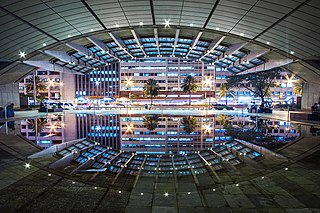
Makati, officially the City of Makati, is a highly urbanized city in the National Capital Region of the Philippines, known for being one of the leading financial center in the country. As of 2013, the city has the highest concentration of multinational and local corporations in the Philippines. Major banks, corporations, department stores as well as foreign embassies are based in Makati. Makati is also known for being a major cultural and entertainment hub in Metro Manila. According to the 2020 census, it had a population of 629,616 people, making it as the 47th most populous city in the country and ranked as the 41st most densely populated city in the world with 19,336 inhabitants per square kilometer or 50,080 inhabitants per square mile. In 2023, ten eastern barangays were removed from Makati's jurisdiction as a result of the Makati–Taguig boundary dispute ruling, resulting in a reduction of the city's population to 292,743. Although its population was just above half a million, the daytime population of the city is estimated to be more than three million during a typical working day because of the large number of people who go to the city to work, shop, and do business.

Rizal, officially the Province of Rizal, is a province in the Philippines located in the Calabarzon region in Luzon. Its capital is the city of Antipolo. It is about 16 kilometers (9.9 mi) east of Manila. The province is named after José Rizal, one of the main national heroes of the Philippines. It is bordered by Metro Manila to the west, Bulacan to the north, Quezon to the east and Laguna to the southeast. The province also lies on the northern shores of Laguna de Bay, the largest lake in the country. Rizal is a mountainous province perched on the western slopes of the southern portion of the Sierra Madre mountain range.

Iglesia ni Cristo is an independent Nontrinitarian Christian church, founded in 1913 and registered by Felix Y. Manalo in 1914 as a unipersonal religious corporation to the Insular Government of the Philippines.
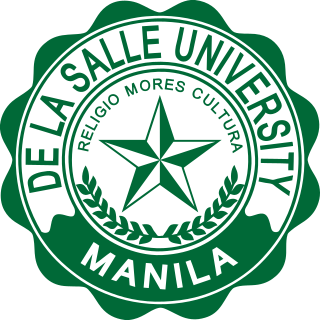
De La Salle University, also referred to as DLSU, De La Salle or La Salle, is a private, Catholic coeducational research university run by the Institute of the Brothers of the Christian Schools in Taft Avenue, Malate, Manila, Philippines. It was established by the Christian Brothers in 1911 as De La Salle College (DLSC) in Nozaleda Street, Paco, Manila with Blimond Pierre Eilenbecker, FSC serving as director, and is the first De La Salle school in the Philippines. The college was granted university status on February 19, 1975, and is the oldest constituent of De La Salle Philippines (DLSP), a network of 16 educational institutions, established in 2006 replacing the De La Salle University System.

Ermita is a district in Manila, Philippines. Located at the central part of the city, the district is a significant center of finance, education, culture, and commerce. Ermita serves as the civic center of the city, bearing the seat of city government and a large portion of the area's employment, business, and entertainment activities.

Ateneo de Manila University, also known simply as Ateneo de Manila or Ateneo, is a private, Catholic research university and basic education institution in Quezon City, Philippines. Founded in 1859 by the Jesuits, it is the second-oldest Jesuit-administered institution of higher learning in the Asia-Pacific.

Christianity is the predominant religion in the Philippines, with Roman Catholicism being its largest denomination. Sizeable minorities adhering to Islam, Dharmic religions, and indigenous Philippine folk religions are also present.

The Convention of Philippine Baptist Churches (CPBC) is a Baptist Christian denomination in the Philippines. It is affiliated with the Baptist World Alliance and is headquartered in Jaro, Iloilo City. CPBC was founded in 1900 as the oldest and first organized union of Baptist churches in the Philippines. This occurred after the country opened to Protestant American missions in 1898, following Spain's transfer of the Philippine islands to the United States.

Eduardo Villanueva Manalo also known as Ka Eduardo is the current Executive Minister of the Iglesia ni Cristo (INC). He is the third generation of the Manalo family to lead the church following his father, the late Eraño G. Manalo, and his grandfather, Felix Y. Manalo.

Leandro Valencia Locsin, Sr., also known by the initials LVL and the nickname "Lindy", was a Filipino architect, artist, and interior designer known for his use of concrete, floating volume and simplistic design in his various projects. An avid collector, he was fond of modern painting and Chinese ceramics. He was proclaimed a National Artist of the Philippines for Architecture in 1990 by the late President Corazon C. Aquino.
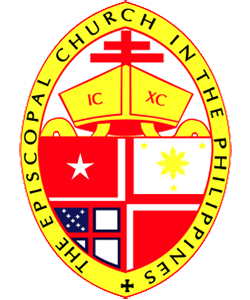
The Episcopal Church in the Philippines is a province of the Anglican Communion comprising the country of the Philippines. It was established by the Episcopal Church of the United States in 1901 by American missionaries led by Charles Henry Brent, who served as the first resident bishop, when the Philippines was opened to Protestant American missionaries. It became an autonomous province of the Anglican Communion on May 1, 1990.
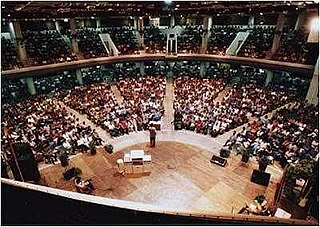
Bread of Life Ministries International is a Filipino Evangelical megachurch founded by Rev. Caesar "Butch" L. Conde. It was founded in Quezon City in 1982.

The United Church of Christ in the Philippines is a Christian denomination in the Philippines. Established in its present form in Malate, Manila, it resulted from the merger of the Evangelical Church of the Philippines, the Philippine Methodist Church, the Disciples of Christ, the United Evangelical Church and several independent congregations.

In Metro Manila, Philippines, tourism is a significant industry. In 2012, the city and the region welcomed 974,379 overnight visitors. Serving as the main gateway to the Philippines' numerous destinations, the city attracts mainly international tourists, with a total of 3,139,756 visitors in 2012. Global Blue ranks Manila as the eleventh 'Best Shopping Destination' in Asia. The city holds the tenth position in MasterCard's global top 20 fastest-growing cities for international visitors from 2009 to 2013.
Numerous events and festivals are held annually in Metro Manila. They include:
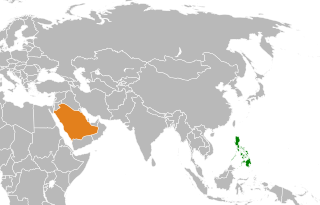
Philippines–Saudi Arabia relations are the bilateral relations between the Philippines and Saudi Arabia. Formal diplomatic relations between the two countries were established on October 24, 1969.

The Cultural Center of the Philippines Complex, also known as the CCP Complex, is an 88-hectare (220-acre) art district managed by the Cultural Center of the Philippines (CCP) located along Roxas Boulevard in Metro Manila, Philippines. It is a mixed-use cultural and tourism hub overlooking Manila Bay in south-central Manila, most of which fall under the jurisdiction of the city of Pasay.

The Tanghalang Francisco Balagtas, formerly known as the Folk Arts Theater, was a theater located in the Cultural Center of the Philippines Complex in Malate, Manila. It is a covered proscenium amphitheater owned by the Cultural Center of the Philippines that was a popular venue for concerts during the 1980s and 1990s. The theater, named after Filipino poet Francisco Balagtas, has a seating capacity of 8,458 in 10 sections and features a broad fascia with a single column-to-column span of 80 meters (260 ft). It is the largest single-span structure in the country, with a 100-by-100-meter roof resting on eight monumental columns. In her book "Cultural Center of the Philippines: Crystal Years," Visitacion de la Torre described it as a sheltered plaza with a roof that "appears to float, creating the impression that the building is a dream on one's tender hands."
Bonifacio Parabuac Ilagan, often known just as Boni Ilagan, is a Filipino playwright, screenwriter, filmmaker, journalist, and editor best known for numerous socially-conscious, critically-acclaimed works in theater, film and television, most notably the films The Flor Contemplacion Story (1995), Dukot, Sigwa, and Deadline ; as well as his first play, Pagsambang Bayan (1976), which portrayed the human rights violations of the Marcoses. He is also one of the prominent torture victims who survived the Marcos dictatorship.
References
- ↑ Chong, Terence (6 March 2018). Pentecostal Megachurches in Southeast Asia: Negotiating Class, Consumption and the Nation. ISEAS-Yusof Ishak Institute. p. 161. ISBN 978-981-4786-88-1 . Retrieved 4 April 2022.
- 1 2 Reynon, Glenn Irwin Cruz (June 2020). "Isang Mapanuring Paghahambing sa mga Teorya at Praxis ng Pampananampalatayang Inkulturasyon nina Anscar Chupungco At Ed Lapiz". Malay (in Tagalog). 32 (2). Retrieved 4 April 2022.
- ↑ De Guzman, Susan A. (26 January 2017). "THROWBACK: Folk Arts Theater, 43 years after first Miss Universe in PH". news.abs-cbn.com/. Retrieved 4 April 2022.
- ↑ "Pistang Kristyano 2001 Slated". Philippine Daily Inquirer. 30 April 2001. Retrieved 4 April 2022.
- ↑ Jones, Mary. "Recovering & Redeeming our Culture" (PDF). International Christian Dance Fellowship. Retrieved 4 April 2022.
- ↑ "Program Schedule". dzas.febc.ph. Retrieved 4 April 2022.